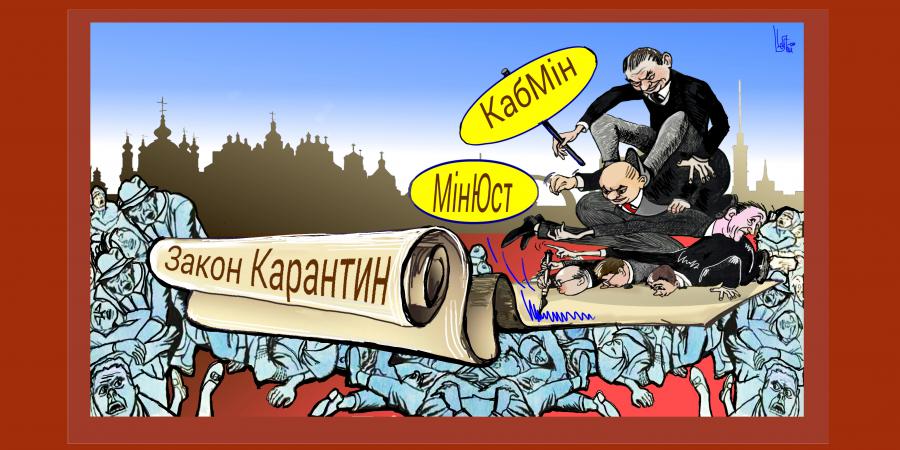
14.04.2020225100
Chronicle of the crime
On 11th of March this year, the Cabinet of Ministers of Ukraine (CMU), chaired by Prime Minister Denys Shmygal, issued Resolution № 211 “On Prevention of the Spread of the COVID-19 Coronavirus in Ukraine”.
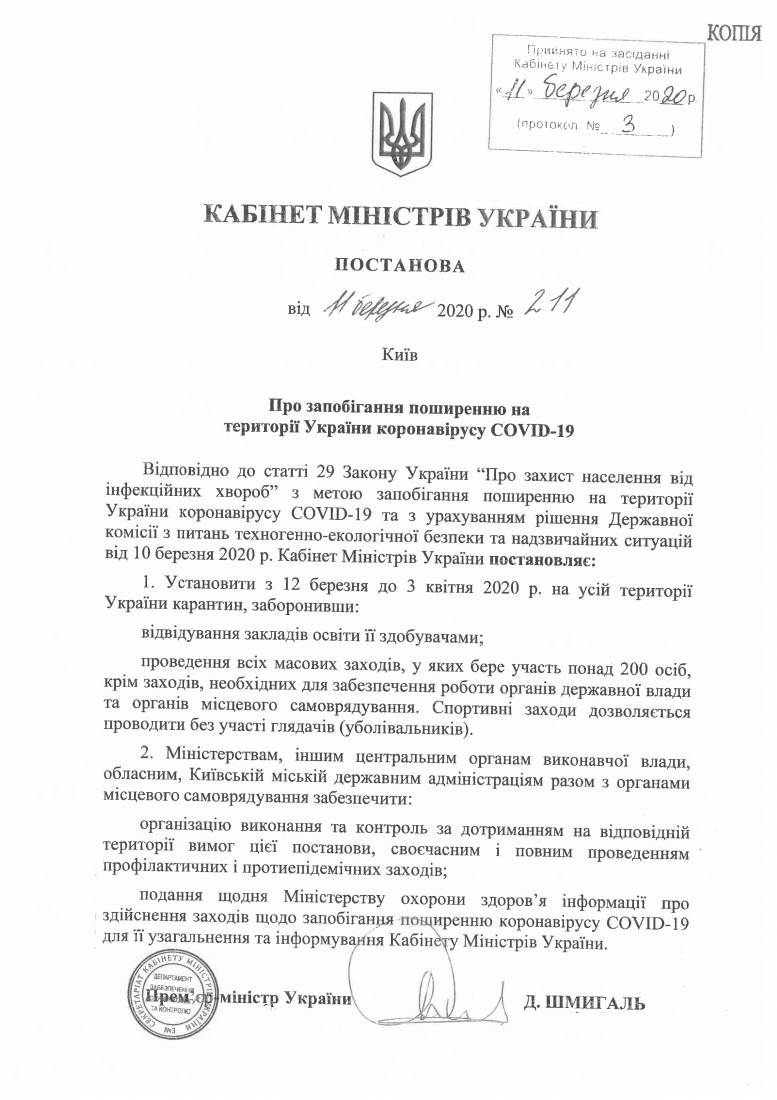
Resolution № 211 prohibits visiting educational institutions and holding all mass events involving more than 200 people.
On March 16, the CMU issues the following Resolution № 215 “On Amendments to the Resolution of the CMU of March 11, 2020 № 211”.
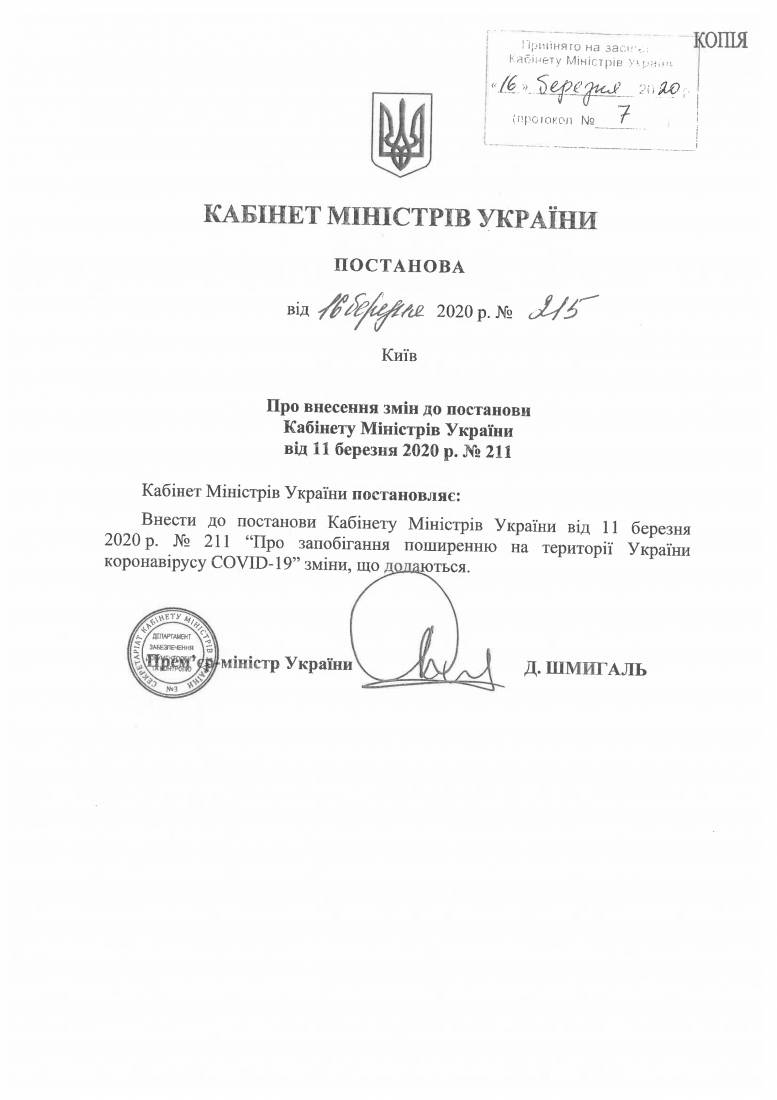
By this resolution, the Government establishes quarantine throughout Ukraine until April 3, 2020, and in addition to the ban on visiting educational institutions, prohibits all mass events involving more than 10 people and further on the list: business entities, regular and irregular transportation passengers by road, transportation of passengers by subway and rail.
People are deprived of the opportunity to move around cities and Ukraine in general. Also, the bulk of the working population, living from salary to salary, remains without the possibility of earning.
On March 25, the CMU issues the following Resolution № 239 “On Amendments to the Resolution of the CMU of March 11, 2020 № 211”, which extends quarantine until April 24, 2020 and temporarily restricts crossing the state border of Ukraine.
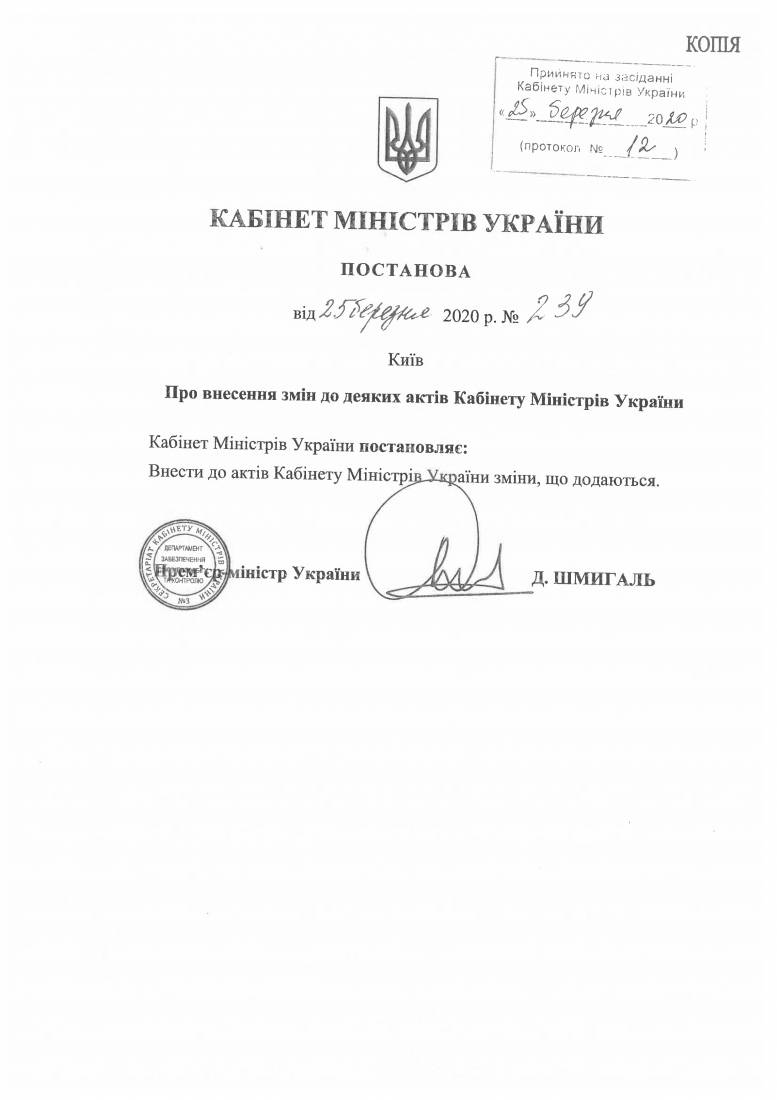
To confirm its serious intentions, on the same day, March 25, according to the plan to combat the spread of coronavirus infection, the Government, chaired by Prime Minister Denis Shmygal, by its Order № 338-r introduces a state of emergency throughout Ukraine for 30 days , until April 24, 2020.
By the way, Prime Minister Denis Shmygal emphasized that the state of emergency does not limit the constitutional rights of citizens, but only consolidates efforts to overcome the threat.
What is an “emergency situation” is defined in subparagraph 24 of Article 2 of the Civil Protection Code of Ukraine? This is “a situation in a particular area or business object on it or a water body, which is characterized by a violation of normal living conditions caused by a catastrophe, accident, fire, natural disaster, epidemic, epizootic, epiphysis, use of means of destruction or other dangerous an event that has led (may lead) to a threat to life or health of the population, a large number of deaths and injuries, significant material damage, as well as the impossibility of living in such an area or facility, conducting business on it. ”
Taking into account the measures already taken to prevent the spread of COVID-19 coronavirus in Ukraine, Prime Minister Denis Shmygal on April 2 at an extraordinary meeting of the CMU signed regular amendments to Resolution № 255 “On Amendments to the Resolution of the CMU 2020 № 211 ”.
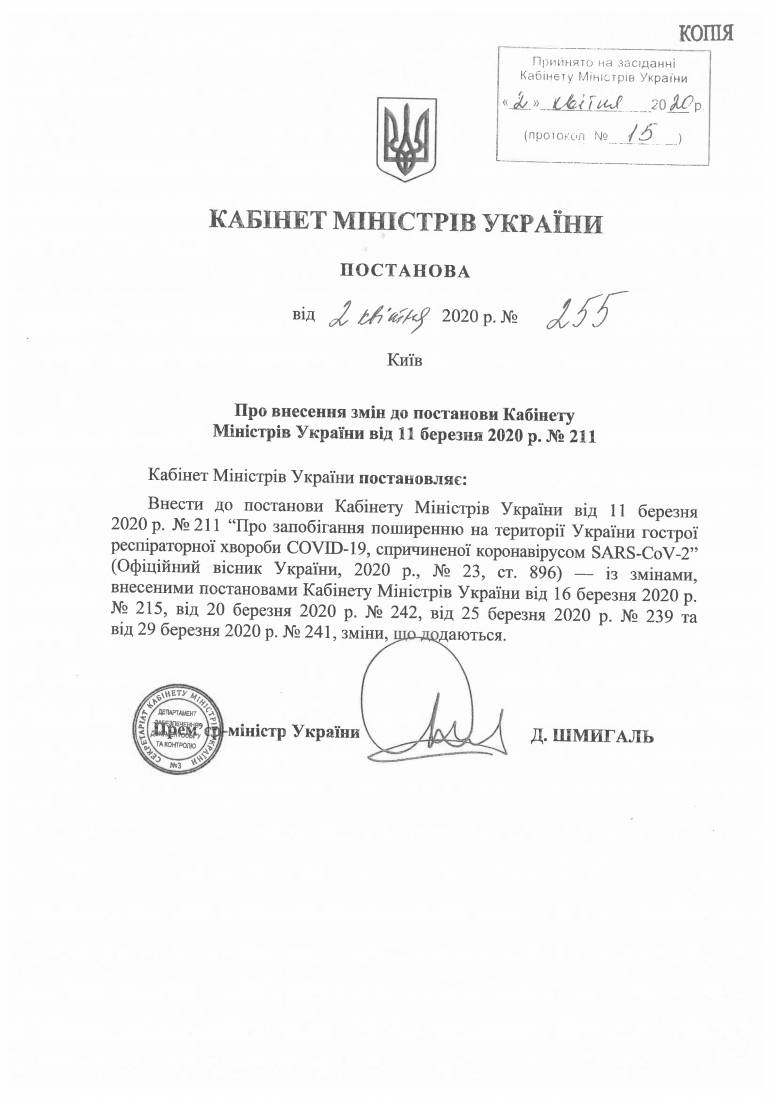
By this resolution, the Government establishes quarantine throughout Ukraine until April 24 and continues to “tighten the screws” (increases requirements to citizens) by restricting their constitutional rights. In addition, from April 6, it is forbidden to be in public places without wearing personal protective equipment, moving in a group of more than two people, visiting parks and recreation areas, visiting sports fields, and being outside without documents.
Consequences of the “paper conflict”
And what is happening at the moment in government institutions? The activities of law enforcement agencies, especially of the police, are focused on combating violators of quarantine and those who disagree with the decisions of the Government, intimidation of citizens with financial responsibility. Investigative activity is almost nonexistent.
The fight against corruption and corrupt officials of relevant bodies such as NABU and DBR has been annulled: as they plundered Ukraine under the previous government, they continue to do so now, gaining momentum. Some rob and some trade in governmental positions.
Publicity and openness of the trial are leveled by the courts.
At a time when almost the entire society is deprived of earnings and small and medium-sized businesses are destroyed, the oligarchs continue to make extra profits.
And here — “cherry on the cake”! During a pandemic, the Verkhovna Rada of Ukraine adopts a law on the sale of Ukrainian land.
However, let’s not rush to assess any events — let’s focus first on what allowed the authorities to rob Ukrainian citizens and turn them into slaves
We are not slaves. Slaves — are not us
What is the resolution of the CMU? It is a legal act. In legal terminology, a normative legal act is an official written document that is ratified by an authorized body, establishes, changes or cancels the commands of the law.
Article 117 of the Constitution of Ukraine specifies that normative legal acts are subject to state registration in accordance with the procedure established by law.
It is also enshrined in the Decree of the President of Ukraine № 493 of 03.10.1992 “On state registration of regulations of ministries and other executive bodies”, and put into effect by the Resolution of the CMU № 731 of 28.12.1992 “On approval of the Regulation on state registration of normative legal acts of ministries and other executive bodies ”. According to Art. 4 Regulations on state registration of normative legal acts of ministries and other executive parties:
“State registration of a legal act consists in conducting a legal examination of its compliance with the Constitution and legislation of Ukraine, the Convention for the Protection of Human Rights and Fundamental Freedoms of 1950 and its protocols, international treaties of Ukraine, approved by the Verkhovna Rada of Ukraine, and Ukraine’s commitment to European integration and European Union law (EU acquis), anti-corruption and gender expertise, taking into account the case law of the European Court of Human Rights, as well as the decision on state registration of this act, its registration number and entry in the Unified state register of normative legal acts ”.
Taking the above into account, the All-Ukrainian magazine “Corruptiner in Ukraine” addressed a request to the Ministry of Justice of Ukraine (MinistryofJustice), requesting information and copies of documents on the MinistryofJustice examination and providing an opinion on compliance with the law — Resolution of the CMU 1 211, The Constitution and legislation of Ukraine, the Convention for the Protection of Human Rights and Fundamental Freedoms (of the 1950 year) and its protocols, international treaties of Ukraine and the case of implementation to provide a copy of the conclusion.
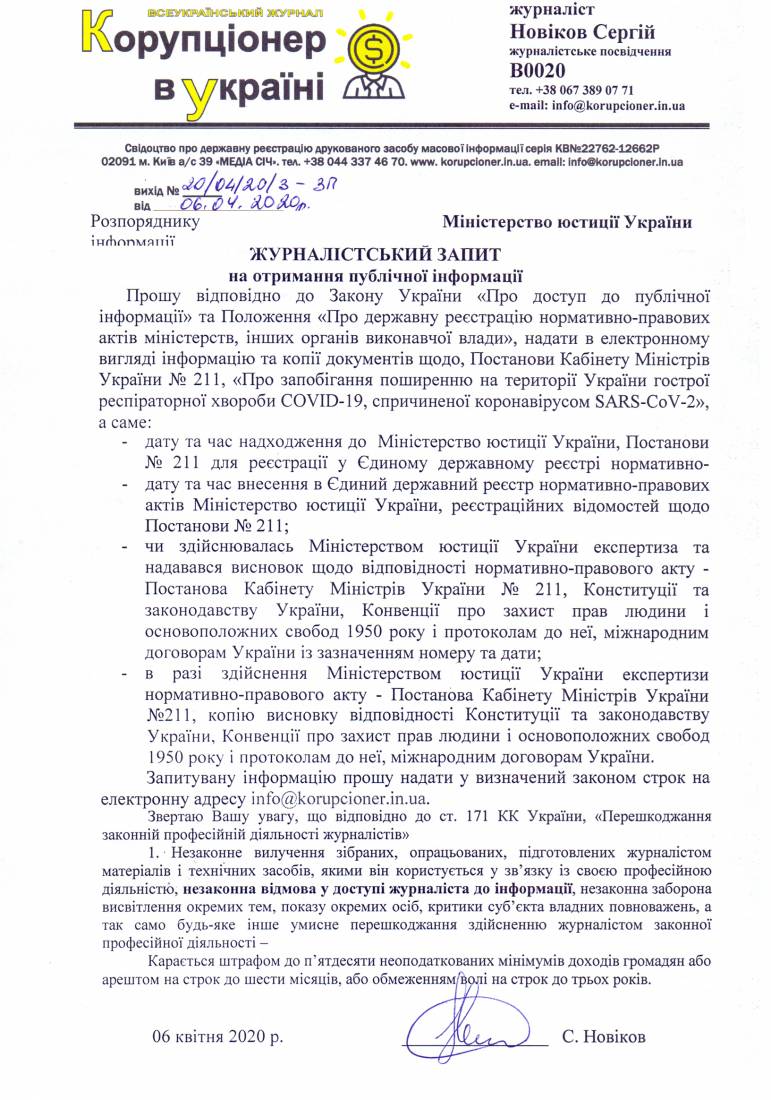
The response of the MinistryofJustice, signed by Deputy Minister Oleksandr Banchuk, did not come as a surprise but confirmed the assumption of no examination, but the reason for not carrying the examination was very surprising:
“At the same time, we would like to inform you that the relevant draft of the resolution of the CMU has not been submitted to the MinistryofJustice for legal examination and examination of compliance with the Convention for the Protection of Human Rights and Fundamental Freedoms.”
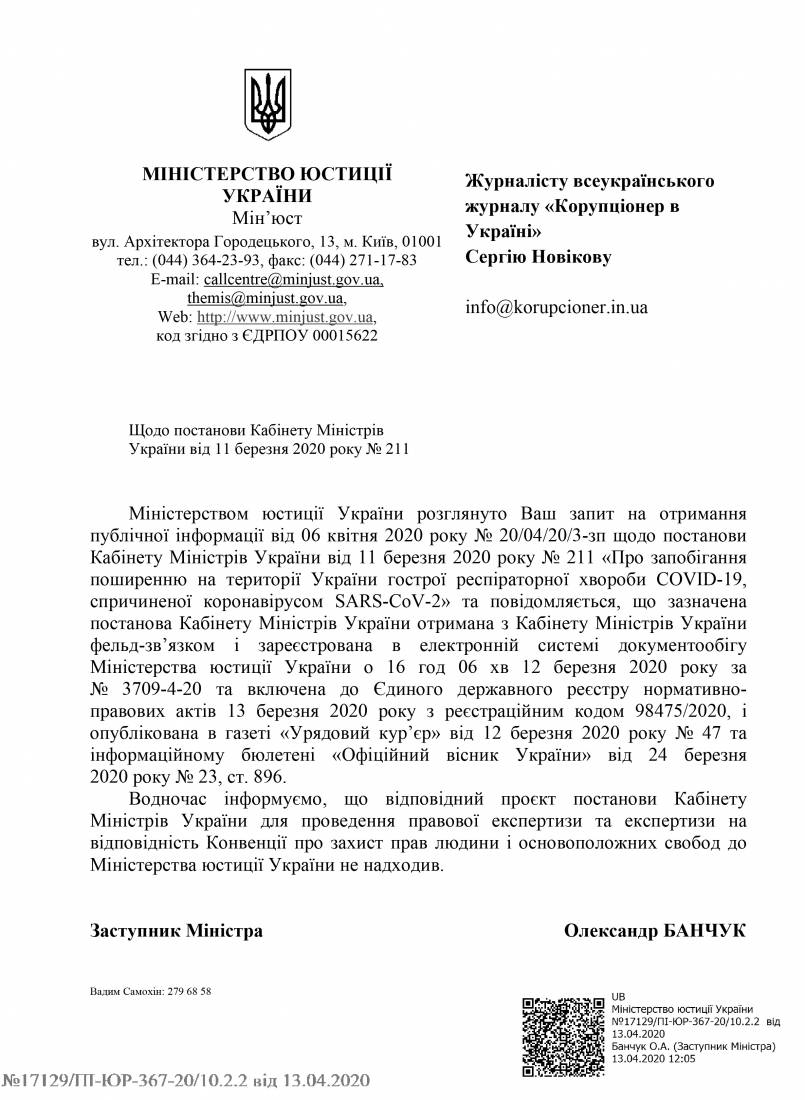
In his reply, Oleksandr Banchuk “forgot” to note that the examination of the Resolution of the Cabinet of Ministers of Ukraine № 211 was not carried out, not only on compliance with the Convention for the Protection of Human Rights and Fundamental Freedoms but also on the Constitution, Ukrainian legislation and international agreements.
And all this indicates that the Ministry of Justice of Ukraine in entering into the Unified State Register of regulations, relevant data, violated Article 4 of the Regulation on state registration of regulations, without conducting a legal examination of compliance with the Resolution of the Cabinet of Ministers of Ukraine № 211 Constitution and legislation of Ukraine, the Convention for the Protection of Human Rights and Fundamental Freedoms of 1950 and its protocols, international agreements of Ukraine.
In the dry residue, we have an illegal “legal” act of the Cabinet of Ministers of Ukraine — Resolution № 211 “On preventing the spread of coronavirus COVID-19 in Ukraine”, which caused the decline of the economy, risks of losing Ukrainian land, destruction of small and medium businesses and impoverishment.
Finally, the questions remain: who will be responsible for the illegitimate decision? How will the Ministry of Justice of Ukraine, being the defendant in court, defend itself against the lawsuit to cancel the registration of Resolution № 211 of the Cabinet of Ministers of Ukraine “On Prevention of the Spread of COVID-19 Coronavirus in Ukraine”?
How will the Government and the state as a whole compensate citizens for the damage caused by irresponsible decisions and criminal acts?
Something about the imposition of a state of emergency in civilized countries: in making such decisions, the governments of these countries take full economic and social responsibility to their taxpayers and do not try to rob them under the guise of these measures.
#CMU #MinistryofJustice #DenisShmygal #quarantine #resolution211
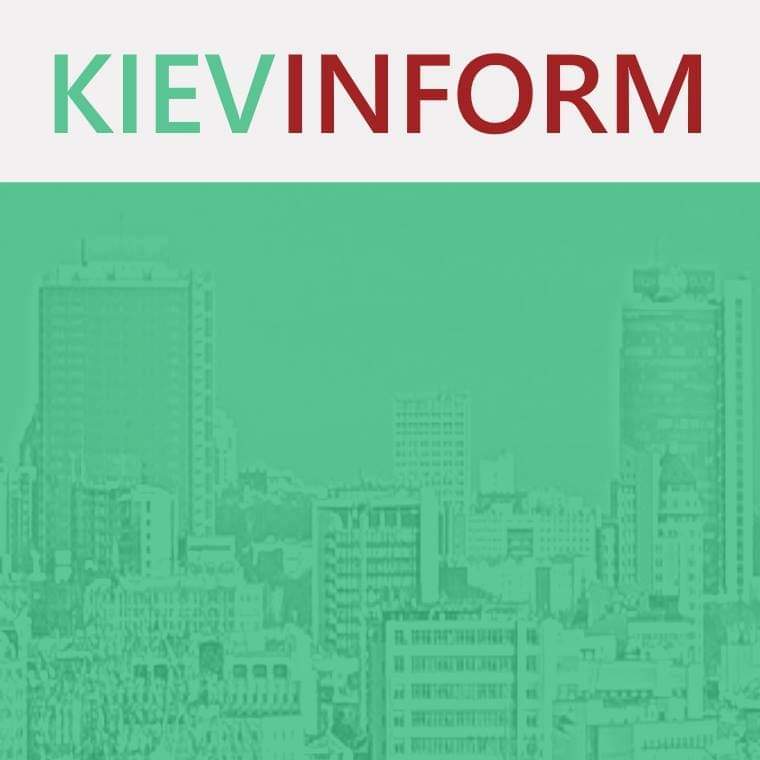
 10316
10316 11330
11330 10648
10648 7350
7350